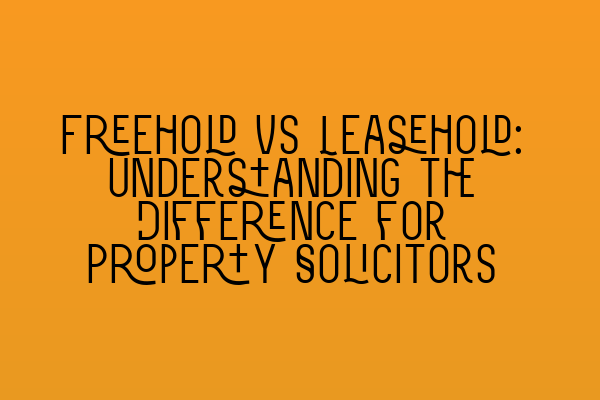Freehold vs Leasehold: Understanding the Difference for Property Solicitors
As a property solicitor, it is crucial to have a deep understanding of the different types of property ownership. One of the most common distinctions you will come across in your practice is the difference between freehold and leasehold. In this blog post, we will delve into the intricacies of each type of ownership and highlight the key differences you need to be aware of when advising your clients.
Freehold Ownership
Let’s start by examining freehold ownership. Put simply, owning a freehold property means that you have full and outright ownership of both the property and the land it sits on. This is the most straightforward and secure form of property ownership, as the owner has complete control and cannot be subject to the whims of a landlord or leaseholder.
Freehold properties are often houses, bungalows, or detached buildings, but they can also include commercial premises and land. Effectively, the owner has the rights to use, modify, and sell the property as they see fit, within the boundaries of local planning regulations and any specific legal restrictions.
As a property solicitor, it is crucial to understand the legal implications of freehold ownership. You will need to advise clients on matters such as boundary disputes, property rights, and potential restrictions associated with the property. Obtaining a freehold property is generally seen as a favorable investment due to its long-term security and potential for capital appreciation.
Leasehold Ownership
Now let’s turn our attention to leasehold ownership. Leasehold means that the property is held under a lease agreement with a freeholder, who retains ultimate ownership of the land and property. Leasehold properties are commonly found in apartment buildings, flats, and some commercial premises. The leaseholder has the right to occupy and use the property for a specific period as outlined in the lease agreement.
Leasehold ownership comes with certain legal obligations and restrictions. The lease agreement will typically specify the duration of the lease, any ground rent payable to the freeholder, and the rights and responsibilities of the leaseholder. It is essential for property solicitors to carefully review lease agreements and advise clients on their rights and obligations as leaseholders.
Leasehold properties are subject to an annual or periodic ground rent payment, which is usually a nominal amount. Additionally, leaseholders may be required to contribute towards the maintenance and repair of the building or estate through service charges. It is crucial to guide clients through these financial obligations and clarify any potential disputes that may arise in relation to them.
Differences and Considerations
Now that we have explored the basic concepts of freehold and leasehold ownership, let’s summarize the key differences and considerations to keep in mind:
- Ownership: Freehold grants outright ownership, while leasehold involves ownership for a defined lease period.
- Control: Freeholders have greater control and autonomy over their property, whereas leaseholders may be subject to certain restrictions imposed by the freeholder.
- Financial Obligations: Leaseholders are typically responsible for ground rent and service charges, in addition to any mortgage repayments or insurance costs. Freeholders, on the other hand, do not have these specific financial obligations.
- Rights and Responsibilities: Freeholders have the right to make decisions regarding modifications, alterations, or extensions to the property. Leaseholders may require permission from the freeholder for such changes.
- Length of Ownership: Freehold ownership is indefinite, while leasehold ownership is for a specified period. It is crucial to keep track of lease expiry dates to ensure proper planning for the future.
As a property solicitor, you play a crucial role in ensuring your clients fully understand the implications of freehold and leasehold ownership. By providing accurate and comprehensive advice, you can help them make informed decisions when buying or selling property.
At SQE Property Law & Land Law, our team of expert solicitors are well-versed in all aspects of property ownership. If you require professional legal guidance or have any questions regarding freehold or leasehold, please do not hesitate to contact us. We are here to help!
Related Articles:
